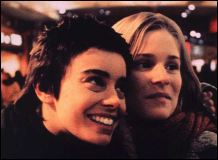![[Deep Focus]](../../flicker/logo.gif) |
|
|
THE DREAMLIFE OF ANGELS | |
 |
GRADE: B+ | Élodie Bouchez and Natacha Régnier |
|
A giddily naturalistic fable that shines as a gender-switched buddy movie before taking a disconcerting turn for the somber, The Dreamlife of Angels is luminously humane. Directed by first-timer Erick Zonca and photographed simply yet expressively by Agnès Godard, the film's deceptively casual rhythms draw you underneath, to a sort of coming-of-age story -- a heartbreaking tale for lost children in their 20s. As street-smart tomboy Isa, Élodie Bouchez is the film's pumping heartbeat -- a tightly-packed dynamo who suggests a cross between Truffaut's Antoine Doinel and fem DIY-rock icon Ani DiFranco. As the more reserved but still fiery Marie, Natacha Régnier's beauty and hairtrigger temper embody the tragedy flowing deep beneath the film's surface. In most ways, the two characters are complementary. The destitute Isa, for instance, carries her world on her back and isn't ashamed to hit up passersby for cash or shelter. Marie, by contrast, lives in a spartan but relatively spacious apartment that seems to indicate stability. In reality, though, she's only housesitting for the apartment's former occupant, a girl named Sandrine who now resides, comatose, in a hospital bed. Thus, Marie's dingy flat is an illusory belonging, an asset that can be stripped from her at any moment. It helps her pretend that she's not so poor and desperate, after all. The day of their meeting as workers in a dressmaker's sweatshop, Isa is bold enough to ask if she can stay at Marie's place. Marie is taken by such surprise that she agrees -- after only a moment of reluctance. In broad terms, Isa is the generous, upbeat counterpoint to Marie's bitter cynicism. Watching the two of them lay about the streets after dark, it's clear that Isa's extroversion helps Marie connect with the people populating the outside world for perhaps the first time. Isa drags Marie out to a shopping mall, where the two of them spend an afternoon ogling and then approaching strange men. It's only through Isa's playfulness - she wants a group of leather-jacketed roadies to let her and Marie into a rock concert - that Marie makes contact with Fredo (Jo Prestia) and Charlie (Patrick Mercado), the sensitive roughnecks watching the door. The corpulent Charlie embarks on an unlikely love affair with the reticent Marie, but relations are broken off when Marie becomes attracted instead to Chris (Grégoire Colin), the roguishly handsome, silver-spooned owner of a local nightspot. Marie's desire to live above her station is demonstrated by her willing subordination of herself to the whims of Chris, a cad if ever there was one. It's that relationship with Chris that begins to strain the relationship between Isa and Marie. Isa, who can hardly believe Marie would fall for such a transparent smoothie, strikes up a relationship with Sandrine, stealing away to the girls hospital bed and sitting at her side. First seen twisted uncomfortably in the bed, eyelids aflutter from REM sleep, Sandrine remains oblivious. In a bid to help her recover, Isa dedicates herself to visiting the girl, sometimes reading aloud from Sandrine's own diaries. It's in these scenes that Dreamlife approaches most closely the heights to which it obviously aspires. Bouchez and Régnier shared the best actress award at Cannes, and for good reason. Godard's deft camerawork aside, their performances are the source of this film's light and heat. So tight, controlled and naturalistic are most of their scenes together that, when they really cut loose at one another, you feel the shouting in your bones. Out of those performances grow the film's strongly defined characters, which are shaped and accentuated by Zonca's clear, economical sense for dialogue. Unfortunately, Marie's blind devotion to Chris -- not just after he has fucked her roughly and refused to call her back, but after she's walked in on him snogging his "real" girlfriend at the bar, who proceeds to berate her cruelly -- is unconvincingly masochistic and predetermined, betraying the typically French brand of fatalism that paints too many of these careful character studies into a corner. Apart from that rather significant cavil, Dreamlife remains for most of its running time an engrossing, occasionally revelatory experience. If it's nothing more than a low-key character study, it's a reminder that, these days, the French do low-key character studies better than anybody. Like his countrymen Benoit Jacquot (The School of Flesh) and Olivier Assayas (Cold Water), but with a less sharply defined visual style, Zonca finds profound meaning in the sometimes lopsided give-and-take relationships -- sexual, professional, and otherwise -- that women maintain with the world around them. | |
|
Directed by Erick Zonca Written by Zonca and Roger Bohbot Edited by Yannick Kergoat Cinematography by Agnès Godard Starring Élodie Bouchez and Natacha Régnier France, 1998 Theatrical aspect ratio: 1.85:1
| |
| You may be able to buy The Dreamlife of Angels from Reel.com. If you do, Deep Focus gets a kickback. |
 |

| |
 http://www.deep-focus.com/flicker/
bryant@deep-focus.com
http://www.deep-focus.com/flicker/
bryant@deep-focus.com